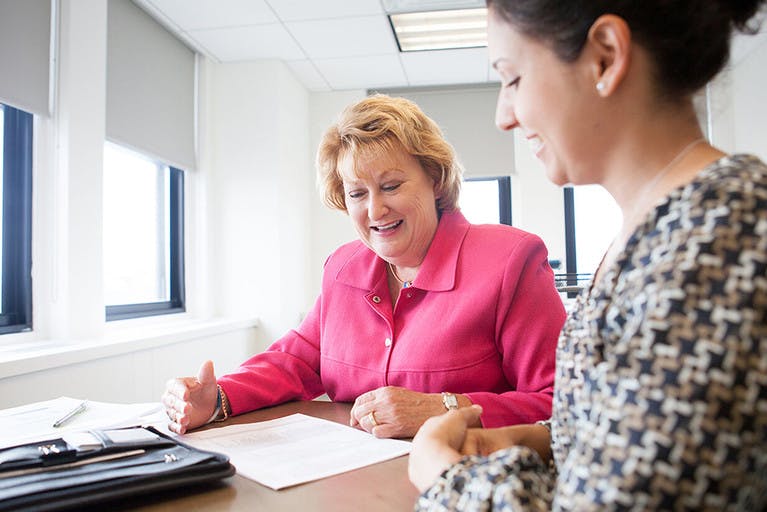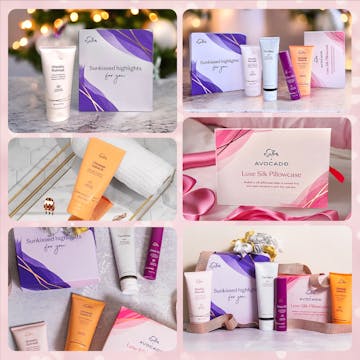Coffee With CancerCare's CEO, Patricia J. Goldsmith
After five years of working with CancerCare across the coast, we wanted to sit down and get to know them the old-fashioned way—with a hot cup of joe. So we hopped on a plane to New York City, scooped up a classic brew, and met with their passionate CEO, Patricia J. Goldsmith. Her story? It can't be missed.
You initially attended Penn State studying Journalism. What inspired you to shift gears to focus on medicine and public health?
Well, it was several things. When I was 19 in college, my only sibling, who was 22, passed away of a brain tumor. That was, without a doubt, a life changing event—not only for me as a teen, but for my family. Years later, I literally picked a pinpoint on the map and decided that I wanted to move to Tampa, Florida. I only knew one person in Tampa, and she was kind enough to set me up with someone who was the vice president of academic physician group. We had lunch and he said, “So you're looking for a job. I don't know what I can have you do, and I am not sure how much I can pay you, but come in on Monday and you can have a job.” I started out in a low level position and I felt at home right away. Health care and academic medicine became my passion. Now, my passion is about making sure that patients have the best information, the best support, and the best access out there.
How did you first hear about CancerCare and how were you introduced to the organization?
I first heard about CancerCare shortly after I relocated from Tampa up to the North East when I took my job at the National Conference of Cancer Network. Fast forward to a number of years later, and CancerCare had engaged in a national search for their next president and CEO. When I walked through the doors and met with the leadership team there, I knew this was the place for me. I felt it immediately. I say to people, “being here is like being in a cult, but in a really good way.” I have employees that have been here for 40 years. When I joined the organization my first day, I asked a woman, “how long have you been here” and she said, “oh I'm a newbie, I've only been here five years.” That's how much people love this organization—it's a passion. There's something very special about being in a place every day, and seeing that you have made a difference in hundreds of people's lives.
How do you think that CancerCare has changed your outlook on life?
Literally out of the blue, ten days before I started my position as CEO of CancerCare, I was diagnosed with cancer. I later realized in a sort of odd way that it was a gift, because it made me understand firsthand what everybody that we're serving is going through, and it made me realize what an amazing and compassionate staff we have here. I learned that cancer had actually made me a better person and a better CEO. It's made me appreciate life, and it's made me appreciate this organization even more.
We're big advocates of self-care—how do you get outside of the hustle-and-bustle of Manhattan and find space for self-care living in New York?
This is a great question. My self-care comes in several different forms, because cancer has taught me to appreciate small things. So just going back to my home in Pennsylvania on the weekends, seeing my dog, sitting on my deck listening to the birds, enjoying a good cup of coffee, or maybe a glass of wine at night—that is nirvana to me. I have found such joy and my self-care doesn't come in the form of big things, just the things that bring me inner peace.
It can be difficult to find hope when you're dealing with medical issues. How do you find and spread hope?
I am a firm believer that hope comes in many ways. Almost everyone in this world knows someone that has been diagnosed with cancer, has lost their life to cancer, or has been impacted by cancer. People quantify hope in big ways, like “hope that you survive,” or “hope that you have a long high-quality life.” But hope can also come in small ways. You can hope that someone on the other line will understand what you're going through and what your feeling, or hope that you can pick up the phone and that someone will say, “yes, we can give you money for your medication,” or “yes, we can pay for your gasoline,” or “yes, we can help you with childcare.” This is a different kind of hope. So there isn't one universal definition of hope, but hope comes in many different forms at CancerCare.
Our past collaborations with CancerCare have always been energizing and deeply motivating, but having the chance to sit down with Patricia, and shake hands with the folks who have dedicated years to aiding people impacted by cancer, has inspired our partnership even more. When we returned to Los Angeles, we couldn't wait to help further their mission and #SpreadHope where it matters most. We hope you feel the same.





